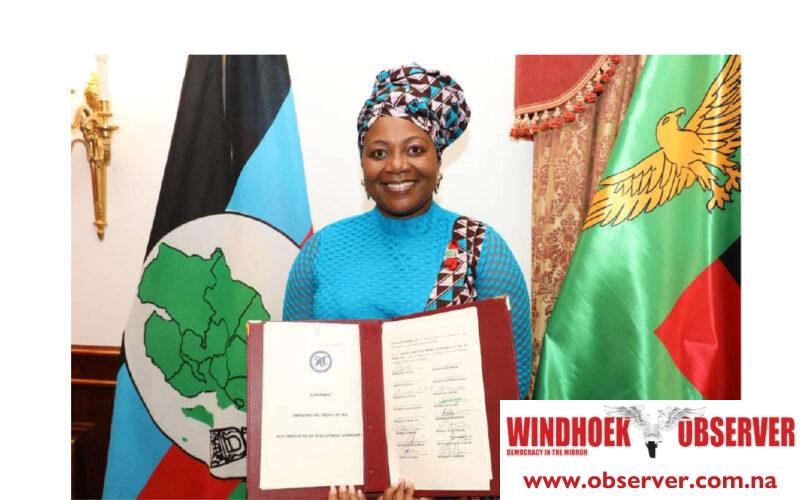Moses Magadza
Zambia has become the 11th SADC Member State to sign the agreement to amend the SADC Treaty establishing the SADC PF, bringing the region closer to having a SADC Parliament.
The signing took place in Luanda, Angola, on Monday, shortly after the official opening of the 55th Plenary Assembly Session of the SADC Parliamentary Forum.
The agreement was signed by Zambia’s Minister of Justice, Princes Kasune, on behalf of Zambia’s President, His Excellency Hakainde Hichilema.
Established in 1997 as an institution of the Southern African Development Community (SADC) in accordance with Article 9(2) of the SADC Treaty, the SADC Parliamentary Forum (SADC PF) is working towards transforming into a SADC regional parliament.
For that to happen, 12 SADC Member States are required to sign the Agreement to amend the Treaty establishing the SADC PF. With Zambia now on board, only one signature is required.
Speaking shortly before the signing, the Speaker of the National Assembly of Zambia, the Right Honourable Nelly Mutti, Senior Counsel, reiterated Zambia’s commitment to the establishment of the SADC Parliament.
“The Forum is now on the verge of actualising the dream of many years of it being transformed into a regional parliament, as is the case in other regional blocks,” she said to applause.
She added: “One of the tangible outcomes of this transformation is the strengthening of the implementation of resolutions by the Forum and action by member Parliaments. We need to collectively change the narrative of being policy giants but implementation dwarfs.”
The Speaker of the Parliament of Zimbabwe, Advocate Jacob Francis Nzwidamilimo Mudenda, chairs a SADC PF Committee spearheading lobbying for the establishment of a SADC Parliament.
He also welcomed Zambia’s signing but urged all SADC member states to join.
“We want to encourage the Democratic Republic of Congo (DRC), Mauritius, Madagascar, and Botswana to please sign the agreement before the 15th of July so that when the heads of state and government meet, they will discuss the nature of the Protocol that will transform the SADC PF into a regional parliament. That would complete the five siblings of the Pan-Africa Parliament. We were the only missing link in southern Africa,” he said.
Mudenda thanked the SADC region’s female Speakers of the Parliaments of SADC Member States and the President of SADC PF, Honourable Roger Mancienne, who is also the Speaker of the National Assembly of Seychelles, for ensuring that Zambia signed the Agreement during the SADC PF Plenary.
He applauded the “the soft skills” of the Speaker of the National Assembly of Angola, Carolina Cerqueira, the Speaker of Zambia, Honourable Mutti and Minister Kasune for facilitating the signing by Zambia.
He also thanked the SADC PF President, as well as members of the lobby team, for their commitment to the SADC PF transformation agenda.
In an interview, Advocate Mudenda revealed that there was political will to transform the SADC PF into a SADC Parliament and said he had enjoyed the support of the Government of the Republic of Zimbabwe through the Parliament as he led lobbying efforts in this regard.
“As chairperson of the lobby team, I wish to place it on record that I have been supported by the Government of Zimbabwe in ensuring that I have the necessary travel arrangements and in terms of funding. Without the funding from my government through the parliament of Zimbabwe, these taxing lobby missions would not have happened,” he said.
He thanked the Executive Secretary of SADC, Elias Mpedi Magosi, for sending an official from his office to the 55th Plenary Assembly of SADC PF to facilitate the signing of the agreement by Zambia.
He said that the lobby team would continue to urge the few SADC Member States that have yet to sign to do so, although only one more signature is required to amend the SADC Treaty and set up the SADC Parliament.
“It has taken us 10 years of intense lobbying. Each time a Head of State was to assume the chair of SADC, we visited them and asked them to convince others in the executive to support the transformation,” he said.
Kasune expressed optimism that all SADC Member States would sign the Agreement and said a regional parliament would unite the SADC region in responding to future challenges.
She said there was “a yearning for participatory democracy among our citizens” which had prompted some parliaments to conduct public hearings and use radio and television to bring parliament closer to the people.
Noting that the SADC PF had developed several SADC Model Laws, Minister Kasune said a SADC Parliament would not only develop more normative frameworks but also work towards promoting their domestication and implementation.


